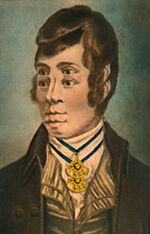Lord Alvin Redund
Lord Al-al-vin-vin Re-re-dund-dund-dund-dund, son of Lord Cletus Redund (1607-1900), 11th count of Peckham, better known as Renard Bastard, was an English nobleman and duelist infamous for having a duel every day of his life until he was finally killed by Sherlock Holmes in 1900.
The Birth of Renard Bastard[edit]
One morning in 1607. Lord Redund is onto his eleventh line of crack and his fifth pipe of opium. He wants to stop, but the psychopathic clowns with Richard Nixon's head won't let him. Reluctantly, he stirs a few more spoonfuls of crack into his tea and takes another draw on his opium whilst imagining his wedding to Oscar Wilde. Just as he's about to say "I do," an irritating high-pitched whining noise distracts him: His wife has started speaking again.
Lady Redund: Darling?
Lord Redund: Piss off! I'm trying to shag Oscar Wilde!
Lady Redund: I've just had another baby!
Lord Redund: How messy! Stick it in the pile with the rest of them.
Lord Redund sinks back into his opium-fueled fantasy to discover, to his horror, that it has changed to the one about the Vaseline and the priest. Meanwhile, Lady Redund flings young Renard bastard into a pile of babies on the other side of the room. Renard awakes to see a screeching stick insect with the plague and a beard perched on top of the chandelier.
Bastard: Mother, get down from the chandelier!
The Life of Renard Bastard[edit]
Five minutes after he was born, Renard killed his mother in a duel over why she had given birth without his permission. He then shot his father "just for the hell of it" and dueled his way through all 500 of the families' servants, dogs, horses, cats, trees and even a parrot named Fred.
He then fled down the street with a flamethrower, which he had rigged up from an oil lamp and a (modified) early prototype of a vacuum cleaner.
Birthdays ((Day of birth, day being born))[edit]
- June 3, 1709
- June 3, 1710
- June 3, 1711
- June 3, 1712
- June 3, 1713
- June 3, 1714
- June 3, 1715
- June 3, 1716
- June 3, 1717
- June 3, 1718
- June 3, 1719
- June 3, 1720
- June 3, 1721
- June 3, 1722
- June 3, 1723
- June 3, 1724
- June 3, 1725
- June 3, 1726
- June 3, 1727
- June 3, 1728
- June 3, 1729
- June 3, 1730
- June 3, 1731
- June 3, 1732
- June 3, 1733
- June 3, 1734
- June 3, 1735
- June 3, 1736
- June 3, 1737
- June 3, 1738
- June 3, 1739
- June 3, 1740
- June 3, 1741
- June 3, 1742
- June 3, 1743
- June 3, 1744
- June 3, 1745
- June 3, 1746
- June 3, 1747
- June 3, 1748
- June 3, 1749
- June 3, 1750
- June 3, 1751
- June 3, 1752
- June 3, 1753
- June 3, 1754
- June 3, 1755
- June 3, 1756
- June 3, 1757
After 1757, Renard stopped having birthdays so that he could spend more time counting the number of days in the year.
